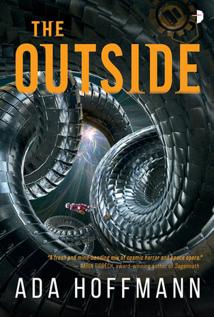
Well, it did what Outside usually did in stories. Showed up. Violated all the known laws of physics. Killed some people and drove the rest mad.
Well that’s certainly an interesting book. It’s one part autism as ‘different, but that’s okay and sometimes it’s a superpower and sometimes it sucks’, one part cosmic horror, and one part fascinating worldbuilding with technoreligion writ large.
Overall, it didn’t quite feel finished to me. There’s a lot of setup, but the ending drew somewhere between a true horror ending and something much ‘better’. There’s potential for a sequel there, but without it, it could have been better. Still an enjoyable enough read.
One of the main reasons this book came up is that it’s got an autistic (lesbian) main character by an openly autistic author. How brains do their brain things are fascinating to me, so I wanted to see how that might change a story. It was interesting. Take that and put it in a world where on one level autism is accepted and dealt with / accommodated, albeit imperfectly (I don’t even know what a perfect world would be in this regard) and might even hold the key to dealing with Outside threats and quantum AI ‘Gods’ (I’ll get back to that) and … it’s neat. I appreciate it. I feel it.
Joy, Yasira thought, as she slunk out of Apek’s office. That struck a chord that it shouldn’t have. Yasira’s neurotype was supposed to be all about joy, about being so in love with science and knowledge and patterns that they eclipsed everything else. She’d been like that as a child, throwing herself into dusty physics texts the way other kids played games or ate candy. So excited when she tackled a new problem that she’d abruptly throw the book down and run around the house laughing. At some point, maybe in grad school, that had faded somehow. Who knew why? She was still good at the things people liked her to do, so there wasn’t much wrong. Maybe it was just part of growing up.
Secondly, you get a touch of cosmic horror. I’m always interested in the idea that there might be more to the world (or more than the world), and cosmic horror is one way to approach that feeling. It’s always tricky to do right, since the entire idea is that ‘Outside’ defies reality–that you just can’t write it down. But you can cetainly evoke the right mode, what with bricks writhing and holes chasing people down. There’s enough of this to but The Outside firmly in the cosmic horror genre.
Akavi waved away her objection. “Stories aside, Outside is a set of phenomena associated with a certain heretical view of physics. The underlying heresy is that space and time as we know them do not exist. That they are convenient illusions allowing the human brain to assimilate reality, but behind them lurks some altogether different reality. And that this reality is somehow realer, or truer, than the reality that humans and Gods know. Does this sound familiar?"
And then finally, there are the Gods. This is a fascinating part of the book that I wasn’t expecting and honestly the sort of thing you could build an entire series/universe around. At some point in the past (as far as I can understand it), humanity reached the technilogical singularity and a series of quantum AI were created–Gods, essentially. Each was or became tremendously powerful, focusing on one specific aspect, just like a pantheon of old. And then under them, we have a wide variety of Angels–augmented humans (and a few aliens, although that’s not as important to the story) with the backing and technology of the Gods and their hands on Earth. It’s very cool.
The Pride of Jai was different from other space stations. Normally it was Gods who moved mortals from one planet to another. When mortals wanted a ship or a station, they bargained – with vows or, more often, with souls – for the God-built. Or they built their own shell, but bargained for portals, warp drives, power sources. The hard parts. The Jai Coalition – scientists from the governments of all three nations on the planet Jai, working together – would be the first to build a station all by themselves. There had been little research stations with crews of perhaps a dozen back on Old Earth before the Gods arose. But on the Pride of Jai, people would live, work, and research full-time. Sustainably. There had been nothing like this ever.
Overall, a lot of neat worldbuilding. Worth reading for that.
Ooh! I hadn’t realized until writing there review that there is a sequel! I’ll have to give that a try. Curious where it goes from here.
“Of course not. You don’t kill a lie by blowing it up. You kill a lie by exposing the Truth underneath.”
“So your plan is… what? To corrupt the whole galaxy into rejecting the Gods?”